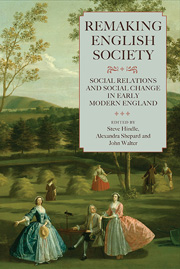Book contents
- Frontmatter
- Contents
- List of Illustrations, Figures, Maps and Tables
- Acknowledgements
- Notes on Contributors
- List of Abbreviations
- 1 The Making and Remaking of Early Modern English Social History
- 2 Brokering Fatherhood: Illegitimacy and Paternal Rights and Responsibilities in Early Modern England
- 3 Gender, Sexuality and the Consumption of Musical Culture in Eighteenth-Century London
- 4 Where was Mrs Turner? Governance and Gender in an Eighteenth-Century Village
- 5 Local Arithmetic: Information Cultures in Early Modern England
- 6 Intoxicants and the Early Modern City
- 7 Food, Drink and Social Distinction in Early Modern England
- 8 Written Obligations, Litigation and Neighbourliness, 1580–1680
- 9 Witchcraft and Neighbourliness in Early Modern England
- 10 Deference, Paternalism and Popular Memory in Early Modern England
- 11 Work, Reward and Labour Discipline in Late Seventeenth-Century England
- 12 Living in Poverty in Eighteenth-Century Terling
- 13 From Commonwealth to Public Opulence: The Redefinition of Wealth and Government in Early Modern Britain
- Appendix: Bibliography of the Published Writings of keith Wrightson from 1974 to 2011
- Index
- Tabula Gratulatoria
- STUDIES IN EARLY MODERN CULTURAL, POLITICAL AND SOCIAL HISTORY
13 - From Commonwealth to Public Opulence: The Redefinition of Wealth and Government in Early Modern Britain
Published online by Cambridge University Press: 05 May 2013
- Frontmatter
- Contents
- List of Illustrations, Figures, Maps and Tables
- Acknowledgements
- Notes on Contributors
- List of Abbreviations
- 1 The Making and Remaking of Early Modern English Social History
- 2 Brokering Fatherhood: Illegitimacy and Paternal Rights and Responsibilities in Early Modern England
- 3 Gender, Sexuality and the Consumption of Musical Culture in Eighteenth-Century London
- 4 Where was Mrs Turner? Governance and Gender in an Eighteenth-Century Village
- 5 Local Arithmetic: Information Cultures in Early Modern England
- 6 Intoxicants and the Early Modern City
- 7 Food, Drink and Social Distinction in Early Modern England
- 8 Written Obligations, Litigation and Neighbourliness, 1580–1680
- 9 Witchcraft and Neighbourliness in Early Modern England
- 10 Deference, Paternalism and Popular Memory in Early Modern England
- 11 Work, Reward and Labour Discipline in Late Seventeenth-Century England
- 12 Living in Poverty in Eighteenth-Century Terling
- 13 From Commonwealth to Public Opulence: The Redefinition of Wealth and Government in Early Modern Britain
- Appendix: Bibliography of the Published Writings of keith Wrightson from 1974 to 2011
- Index
- Tabula Gratulatoria
- STUDIES IN EARLY MODERN CULTURAL, POLITICAL AND SOCIAL HISTORY
Summary
A common wealth is called a society or common doing of a multitude of free men collected together and united by common accord. Although of all thinges or lyuing creatures a man doth shew him selfe most politique, yet can he not well live without the societie and fellowship ciuill.
Sir Thomas Smith (1583)That state is properly opulent in which opulence is easily come at, or in which a little labour, properly and judiciously employed, is capable of procuring any man a great abundance of all the necessaries and conveniencies of life.… National opulence is the opulence of the whole people, which nothing but the great reward of labour, and consequently the great facility of acquiring, can give occasion to.
Adam Smith (c.1763)Although Adam Smith chose to title his great work on the economic organisation of society An Inquiry into the Nature and Causes of the Wealth of Nations, it is not about national power, but about the wealth of the people who happened to live in nations. The very first sentence in his introduction to the work describes how ‘the annual labour of every nation’ is the fund which ‘supplies it with all the necessities and conveniences of life’. The organisation of his book is evidence of what he considered to be most important. He began with the division of labour, and then moved on to the nature of money, exchange and capital formation, before finally dealing with systems of political economy and the revenue of a ‘Commonwealth’.
- Type
- Chapter
- Information
- Remaking English SocietySocial Relations and Social Change in Early Modern England, pp. 317 - 340Publisher: Boydell & BrewerPrint publication year: 2013



